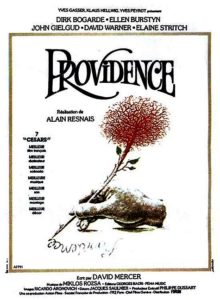 Although the ending sucks, this is a fascinating and altogether unique hallucinatory drama by the famed avant-gardist Alain Resnais. The ADAPTATION of its time, PROVIDENCE is a bold exploration of the creative process that breaks every conceivable cinematic law…which is for the best, methinks!
Although the ending sucks, this is a fascinating and altogether unique hallucinatory drama by the famed avant-gardist Alain Resnais. The ADAPTATION of its time, PROVIDENCE is a bold exploration of the creative process that breaks every conceivable cinematic law…which is for the best, methinks!
The 1977 British-French co-production PROVIDENCE, featuring a cast of acting heavyweights (John Gielgud, Ellen Burstyn, Dirk Bogarde, David Warner and Elaine Stritch), was the first English language film directed by the French “New Wave” master Alain Resnais, and is very much in keeping with heavily experimental Resnais classics like HIROSHIMA MON AMOUR and LAST YEAR AT MARIENBAD. In PROVIDENCE Resnais collaborated with the celebrated playwright David Mercer (whose previous film credits include 1966’s counter-culture classic MORGAN!), just as in HIROSHIMA MON AMOUR he did with the famous novelist Maguerite Duras and with the writer/filmmaker Alain Robbe-Grillete on LAST YEAR AT MARIENBAD. As in those films, the collaboration seems to have inspired both writer and director to previously unexplored heights of creativity.
Clive Langham is a veteran novelist—and all-around asshole—on the eve of his 78th birthday. Ensconced in Providence, his secluded country mansion, Langham falls into a drunken stupor while plotting out his latest novel.
In this new book Langham’s son Claude is the protagonist, a phlegmatic lawyer prosecuting Kevin, who shot and killed an innocent man in a forest, believing the latter was turning into a werewolf. The jury finds Kevin innocent, much to Claude’s dismay, and Kevin goes back to his mistress Sonia, who just happens to be Claude’s wife! Claude, however, is hardly an innocent victim, as he’s carrying on an affair with the elderly Helen, who, as Langham observes, is “old enough to be his mother.” In fact, it gradually becomes clear that in real life Helen was actually the protagonist’s wife Molly Langham…and so really is Claude’s mother!
More real-life facts become clear as the narrative progresses, such as the fact that Kevin is Langham’s illegitimate son and that the abovementioned Molly Langham killed herself, apparently because she couldn’t stand to live with her obnoxious hubbie (a fully understandable reaction, based on what we’re shown). Meanwhile, Langham’s imagined psychodrama continues, periodically interrupted by his bitter, self-effacing rants and frequent trips to the crapper (much attention is lavished on the man’s bowel movements). All the characters in his narrative are calculating, self-absorbed and venal to a fault—just like their creator.
The next day, however, the preceding narrative’s real-life counterparts meet at Providence for Langham’s birthday, and it turns out that the drama he concocted the night before is complete nonsense, as Sonia, Claude and Kevin are all nice, caring people. Langham, however, remains a total asswipe, and relentlessly insults and ridicules his loved ones before unceremoniously sending them away.
Alain Resnais is one of the cinema’s great innovators, and does some of his best-ever filmmaking during the hallucinatory stretch of PROVIDENCE, which takes the form of the central character’s feverish imaginings. Characters appear and disappear unexpectedly, replay actions, repeat dialogue and often break the fourth wall to address their creator, whose voice-over ruminations serve to shape the narrative as it occurs. The scenery is equally important in the way it shifts, often from shot to shot: in one scene a character descends a lengthy staircase to answer a door, but in the next shot the stairs are nowhere to be seen. Likewise, the time period is constantly changing, from a WWII setting (complete with Nazis in the background rounding people up, apparently a “De Rigeur” element in Langham’s fiction) to a modern day one and back again. The result is one of the few truly convincing cinematic portrayals of a creative imagination at work, graced by David Mercer’s exceptionally literate dialogue.
My problem was with the film’s deadly here-and-now third act, set in the scenic back yard of Langham’s estate with his loved ones visiting. The sequence, containing a pointless and distracting 360 degree pan, has no other purpose than to prove to the viewer that Langham’s offspring are really nothing like his imagined portrayals, and in my view is unnecessary, considering that the hallucinatory bits impart the lurid details of Langham’s tortured life with far more complexity and imagination.
Vital Statistics
PROVIDENCE
Action Films/Columbia Pictures
Director: Alain Resnais
Producers: Yves Gasser, Klaus Hellwig
Screenplay: David Mercer
Cinematography: Ricardo Aronovich
Editing: Jean-Pierre Besnard
Cast: Ellen Burstyn, Dirk Bogarde, John Gielgud, David Warner, Elaine Stritch, Denis Lawson, Cyril Luckham, Kathryn Leigh-Scott, Milo Sperber, Anna Wing, Peter Arne
